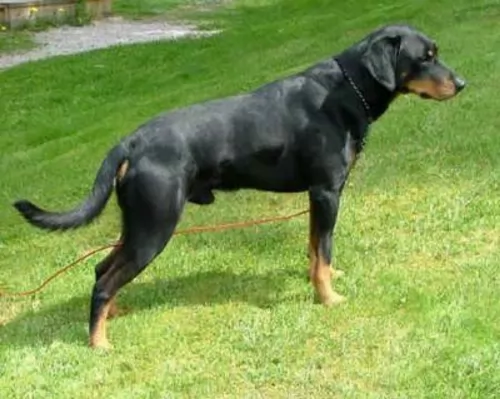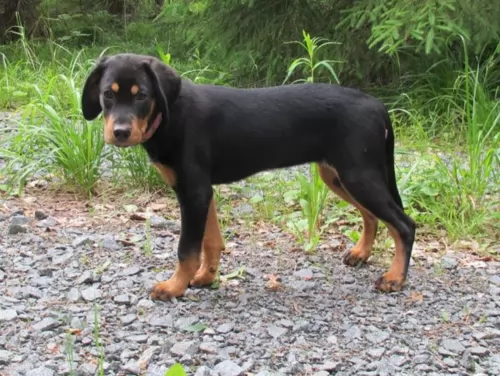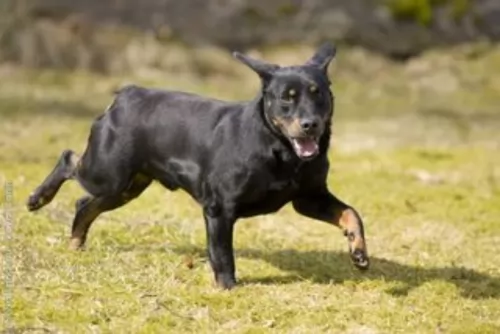 Petzlover
Petzlover Chesapeake Bay Retriever is originated from United States but Smalandsstovare is originated from Sweden. Chesapeake Bay Retriever may grow 12 cm / 5 inches higher than Smalandsstovare. Chesapeake Bay Retriever may weigh 27 kg / 60 pounds more than Smalandsstovare. Both Chesapeake Bay Retriever and Smalandsstovare has almost same life span. Both Chesapeake Bay Retriever and Smalandsstovare has almost same litter size. Both Chesapeake Bay Retriever and Smalandsstovare requires Low Maintenance.
Chesapeake Bay Retriever is originated from United States but Smalandsstovare is originated from Sweden. Chesapeake Bay Retriever may grow 12 cm / 5 inches higher than Smalandsstovare. Chesapeake Bay Retriever may weigh 27 kg / 60 pounds more than Smalandsstovare. Both Chesapeake Bay Retriever and Smalandsstovare has almost same life span. Both Chesapeake Bay Retriever and Smalandsstovare has almost same litter size. Both Chesapeake Bay Retriever and Smalandsstovare requires Low Maintenance.
 Fondly referred to as the Chessie, the ‘Labrador-look-alike’ Chesapeake Bay Retriever’s history extends to St. Johns Newfoundland pups which were rescued off a ship off the coast of Maryland in 1807. The Chesapeake is an American breed.
Fondly referred to as the Chessie, the ‘Labrador-look-alike’ Chesapeake Bay Retriever’s history extends to St. Johns Newfoundland pups which were rescued off a ship off the coast of Maryland in 1807. The Chesapeake is an American breed.
It is believed that the Newfoundland puppies as they grew, were bred with area dogs, with there being few records of the early dogs, but it is believed that spaniels and dogs were included.
In 1918 the Chesapeake Bay Retriever was recognized by the American Kennel Club and in 1964 the dog was declared the official dog of Maryland.
 The Smålandsstövare has got quite a long history and dates back to the 1600s. He is the smallest of the Swedish hound breeds. This is a scenthound.
The Smålandsstövare has got quite a long history and dates back to the 1600s. He is the smallest of the Swedish hound breeds. This is a scenthound.
Hounds similar to the Smålandsstövare were bred with European hounds and then brought to Småland and bred with local spitz-type farm dogs to create the foundation stock for the Smålandsstövare.
The dog was used to hunt but nearly died out in the 20th century, but breeders restored it and the first official standard emerged by the Swedish Kennel Club in 1921.
The Smålandsstövare is a rare dog breed but it is recognized by the American Rare Breed Association as well as other major kennel clubs, one of which is the Federation Cynologique Internationale as well as the United Kennel Club.
 The Chesapeake is a large dog belonging to the Sporting breed group. Perhaps one of the more distinctive features of the Chesapeake Bay Retriever is the yellowish eyes.
The Chesapeake is a large dog belonging to the Sporting breed group. Perhaps one of the more distinctive features of the Chesapeake Bay Retriever is the yellowish eyes.
This is a strong, well muscled dog that stands anywhere from 61 – 66cm and weighs between 30 – 45kg. The short, thick coat of the dog is waterproof and comes in colors ranging from brown to reddish yellow to chestnut shades.
The head of the Chesapeake is broad and roundish with medium length floppy ears. The tail is long. The toes are webbed which helps makes the dog an excellent swimmer as well.
The Chesapeake Bay Retriever is a happy kind of dog with a bright, alert, intelligent expression. He loves water and is guaranteed to make a wonderful pet for any family.
With his wonderful characteristics, it is worth training him and socializing him as this training sets parameters for him so that he becomes a wonderfully obedient dog that gets on well with other pets in the home as well as with children.
 The Smålandsstövare is a muscled, compact looking dog. The double coat is shortish to medium length and is thick and quite coarse to the touch. He sheds seasonally. The coat is usually black with tan markings.
The Smålandsstövare is a muscled, compact looking dog. The double coat is shortish to medium length and is thick and quite coarse to the touch. He sheds seasonally. The coat is usually black with tan markings.
The high set ears are medium length and floppy, the head is slim and the tail can be naturally short. Sometimes the tail is long and can be slightly curved in the spitz-like sabre fashion.
The eyes are brown and friendly. The height of these dogs is about 46 to 54cm and he weighs anything from 15 to 18kg.
Usually a well behaved, quiet, calm, gentle dog, the Smålandsstövare takes his role as guard dog seriously, wanting to protect his family.
His good temperament ensures he gets on well with all members of the family. He is full of energy and will need to be exercised well, whether it be ball games in the garden, a walk around the block, a run in the park or joining his family on hikes and camping trips.
It is why he won’t settle down well on a small property in the city. He needs larger premises to expend his energy, and if in cramped premises without exercise, he may resort to barking and whining and this may well drive your neighbors bats.
Training and socializing your Smålandsstövare will be necessary and it should be easy as he is intelligent.
 The Chesapeake Bay Retriever is ready to be your best friend and companion. This dog breed is highly active and he’ll fit easily into a family that is active and can ensure he is involved in all their activities.
The Chesapeake Bay Retriever is ready to be your best friend and companion. This dog breed is highly active and he’ll fit easily into a family that is active and can ensure he is involved in all their activities.
The beauty about the Chesapeake Bay Retriever is that he is generally an even tempered dog, and once trained and socialized, becomes a truly splendid pet, one that will be loving and loyal with his owners.
 The Smålandsstövare is a robust dog with a lot of stamina. He will be wanting a lot of exercise and is ideal as a pet in the suburbs or the countryside but not ideal for city living.
The Smålandsstövare is a robust dog with a lot of stamina. He will be wanting a lot of exercise and is ideal as a pet in the suburbs or the countryside but not ideal for city living.
He makes a wonderful family pet, forming strong bonds with his owners. He makes an excellent watchdog too wanting to protect his family, and with this amicable, calm dog, you’re going to have a true friend.
 By taking good care of your Chesapeake, you can ensure his teeth remain strong, his nose is wet and his coat glossy and healthy. He is a robust breed as it is, but there are always some common dog diseases to watch out for -
By taking good care of your Chesapeake, you can ensure his teeth remain strong, his nose is wet and his coat glossy and healthy. He is a robust breed as it is, but there are always some common dog diseases to watch out for -
Obesity is an ailment that is afflicting many humans and their pets. Being overweight can bring on a host of unwanted diseases. Obesity is a serious disease that can contribute to digestive disorders, back pain, heart disease and joint problems.
Instead of showering him with little treats to show him how much you love him, rather stroke him or play a game with him – it’s the ultimate treat for him – your attention.
Remember that if you aren’t going to let your Chessie become a parent, the best thing you can do for your male or female is to have them spayed or neutered. In fact, spaying or neutering can decrease the likelihood of your pet getting certain types of cancers as well as other illnesses. Speak to your vet and discover how these procedures can be very beneficial for your pet.
 The Smålandsstövare is a rare dog breed and not much is known about congenital conditions to which he may be particularly prone.
The Smålandsstövare is a rare dog breed and not much is known about congenital conditions to which he may be particularly prone.
With good care he can reach 14 or 15 years of age. The floppy ears put him at risk for ear infections, while other conditions to watch for include hip dysplasia, cancer, bloat and obesity.
If you see your dog shaking his head or pawing at his ears, look inside because the ears may be red and inflamed. It is important to get help quickly for ear problems in dogs.
Ear canals are sensitive so if you don’t want to clean the ear and work on it yourself it is important to get your pet to the vet. The vet will clean your dog’s ears and also prescribe antibiotics.
For future treatment, you will need to clean your dog’s ears and keep them dry. If you don’t want to do this yourself, make sure to get him to professional groomers who will do this for you.
 The Chesapeake Bay Retriever sheds fairly heavily throughout the year. The coat should be brushed at least twice a week to remove dead hair. Brushing is good for the dog too as it distributes the oils of the skin, making his coat shinier.
The Chesapeake Bay Retriever sheds fairly heavily throughout the year. The coat should be brushed at least twice a week to remove dead hair. Brushing is good for the dog too as it distributes the oils of the skin, making his coat shinier.
Because the Chesapeake has floppy ears, the ears will need to be checked on a weekly basis for signs of infection. This is of particular importance if your Chessie loves to spend time splashing around in water. The veterinarian can recommend and also advise on cleaners for your dog’s ears.
An excellent diet and plenty of exercise will ensure your Chessie can live to be 11, 12 or 13 years of age. You want to keep his diet of kibble, rice, vegetables and meat consistent so as not to upset his stomach.
Avoid giving him foods such as chocolates. Do research on the harm you can do to your pet when you feed him some human foods that are entirely not meant for a dog’s digestive system.
The Chesapeake Bay Retriever has always loved to be active - hunting for- and retrieving birds from rivers and lakes. He is used to being active and will require a good supply of exercise. Take him for long walks and let him join you on your runs or your cycling.
 Choosing a good diet is imperative for the Smålandsstövare. Choose a commercially manufactured dog food high in vitamins and minerals.
Choosing a good diet is imperative for the Smålandsstövare. Choose a commercially manufactured dog food high in vitamins and minerals.
Give your dog a treat by providing him with some home-made food. It can be added into the dry kibble about twice a week as a treat. Boil brown rice and chicken in a pot and add in sweet potatoes, carrots and spinach. Chop all this up and give it to your dog in small portions. Also try to include some raw meat into the diet.
The Smålandsstövare is a very energetic breed and he is going to require some vigorous exercise every day. Take him for walks, allow him to run with you when you cycle or jog or take him swimming.